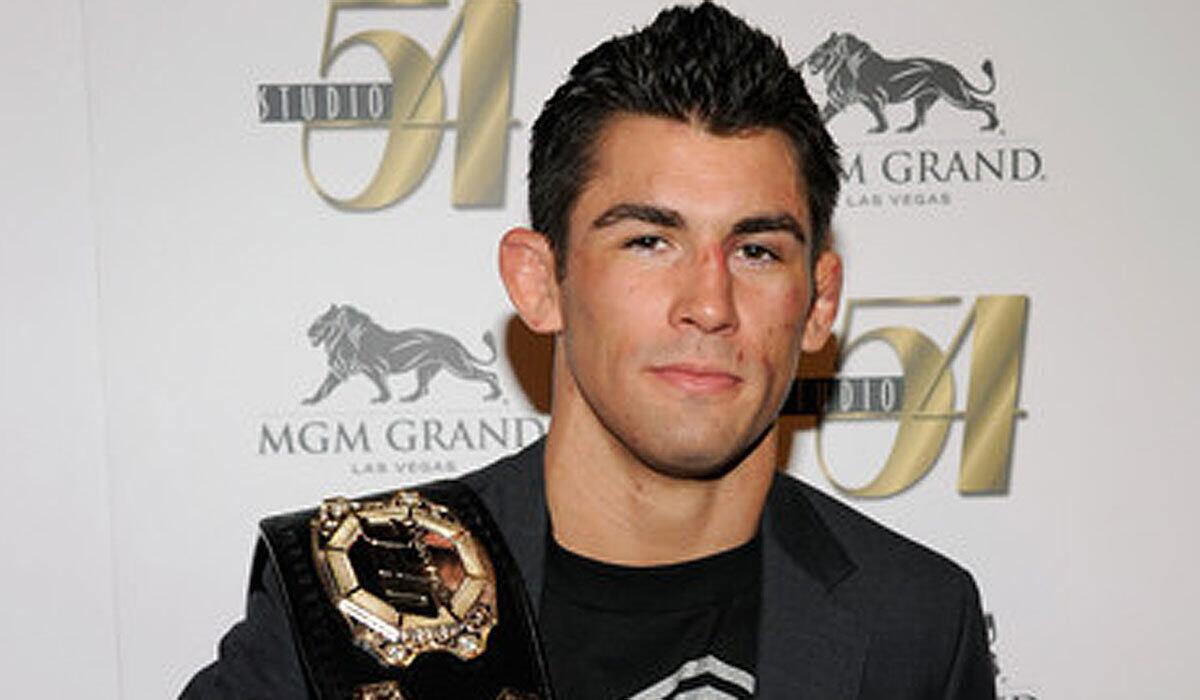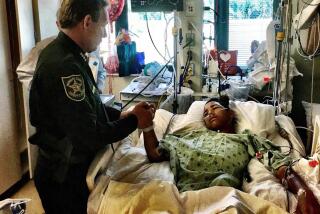UFC’s Dominick Cruz banking on mind games to help him take T.J. Dillashaw’s belt

Dominick Cruz, shown in 2011, has spent much of the last five years battling injuries.
- Share via
Whether or not he recaptures the Ultimate Fighting Championship bantamweight belt Sunday, San Diego’s Dominick Cruz should think long and hard about a career in motivational speaking.
Cruz, who’ll fight champion T.J. Dillashaw on Sunday night in Boston on Fox Sports 1, has fought just once since Oct. 1, 2011, when he successfully defended his bantamweight belt against current UFC flyweight champion Demetrious Johnson.
A string of injuries (three knee, one groin) has sidelined him for such a significant time that other fighters in the same position might have left the sport.
“Quitting wasn’t an option because time was on my side,” Cruz said. “I hurt myself at 26 years old. I’m 30 now. I’m still in my prime. My body’s good. I haven’t taken a whole lot of punishment to my brain or body.
“This means everything now. I’m in full form and happy about it. It’s a lot less nerve-racking when you know you’re healthy and you can just go fight, be myself.”
Easy to say now, but there were many uncertain days to cope with as Cruz’s injuries cost him his belt and a slew of purses.
“You have to be real with yourself and let go of the things you can’t control. I said that to myself so many times,” Cruz told The Times this week in a telephone interview. “It sounds so basic. But if people knew how difficult that really is, to really let go of the things you can’t control …. I found so much peace that way and that’s what I did. It’s hard. But when you’re trapped in your body, you don’t really have a choice.”
Cruz endured a torn knee ligament in 2012 that scrapped a third fight with popular UFC fighter Urijah Faber. Complications from that surgery delayed his return. Then, he tore a groin preparing to fight then-champion Renan Barao.
After beating Takeya Mizugaki by first-round knockout in September 2014, Cruz (20-1) hurt his other knee to delay the Dillashaw match.
“What you’re actually doing by thinking about the things you can’t control is you’re thinking about the future. You’re thinking about what’s going to happen, because you can’t do what you can do now. You can’t do that. You just have to be where you are in the present,” Cruz said.
“Whatever’s making you sad, you’ve got to find a new focus. I became a positive athlete. I turned off the fighter mentality .… Put one foot in front of the other. When you’re in the present, you’ll find a lot of peace and realize you’re actually well off.
“When you think, ‘I should be here … ,’ that’s when the anxiety comes, that’s when the fear comes. I had to let go of that and stop worrying about what could happen. ‘If, if, if’ … it doesn’t matter.”
Cruz did television analysis and helped coach fighters at his gyms in San Diego and El Cajon during his time off from the ring.
“I had two choices: sit and wish I had money, that I was on top, or I could embrace the present day,” Cruz said. “I didn’t have prize-fighting. That was the only thing I knew how to do and survive.
“So I thought, ‘How much tougher would I be if I could figure out how to be happy and survive and make money without it?’ I’ve evolved. I’m not the same person. My mind-set was to get better from it, not let it hold me down.”
He said he navigated the downtime without any professional counseling.
“I’ve been working on my brain since 2010, since I won my first world title in 2010 in [World Extreme Cagefighting] against [a guy] who everyone said was going to knock me out. I’ve been doing that week after week since 2010. What’s the point of having a great car if your engine sucks?”
Now that the the time has come to fight, Cruz finds himself in familiar territory against Dillashaw, a former Cal State Fullerton wrestler who had a riff last year with Cruz’s longtime rival, Faber, and split from Faber’s Sacramento gym, Team Alpha Male.
“[The drama] won’t effect T.J., he’s too self-centered for that,” Cruz said. “That’s why he left. Me and Faber have had our differences, but you can’t deny the amount of money, time, energy that Faber put into T.J. No matter what T.J. says, that has been spent on him. What’d T.J. give back to them? Nothing. Right when he becomes champion, when he finally gives the team the belt they helped him get to, he leaves.
“He didn’t want to be in Faber’s shadow. That’s what it comes down to. It’s Faber’s fault, too. Faber always wants you to do good, but if you know Faber behind the scenes, he doesn’t ever want you to do better than him.
“T.J. was going to have to live under the shadow of Urijah Faber as the champion, even though Faber can’t reach the belt. He wanted his own brand, to have all the attention on him, to be the man. T.J.’s too much of an alpha.”
So there’s personal dislike to fuel Cruz, and the anticipation of reuniting with his belt. No regrets about the past, just an appreciation of now.
“All you can do is look at the habits of the opponent you’re facing and come up with an answer to the habits,” Cruz said. “T.J. has habits. I have habits. I’ve got good jiujitsu, wrestling, stand-up. It’s about letting my actions take over, my reactions -- inherent. Move because you move, don’t think about it. I hadn’t fought in three years before my last fight, and I knocked the guy out. You’re on auto-pilot, and you hope everything you did in camp translates. I’ve just got to go out there and perform.”
More to Read
Go beyond the scoreboard
Get the latest on L.A.'s teams in the daily Sports Report newsletter.
You may occasionally receive promotional content from the Los Angeles Times.











